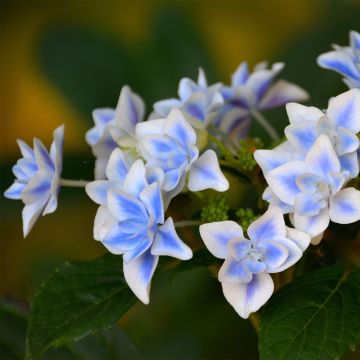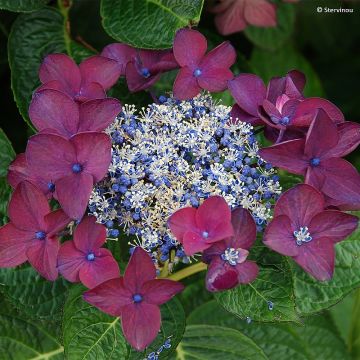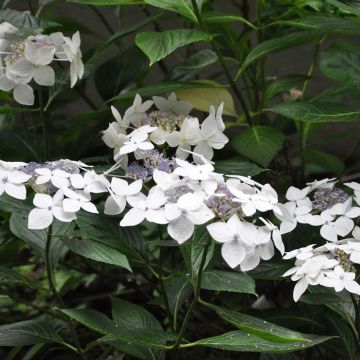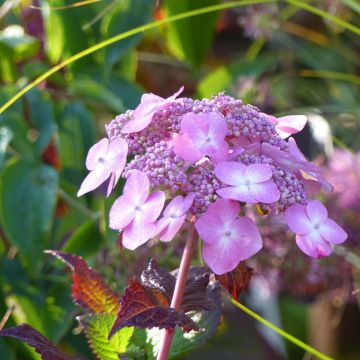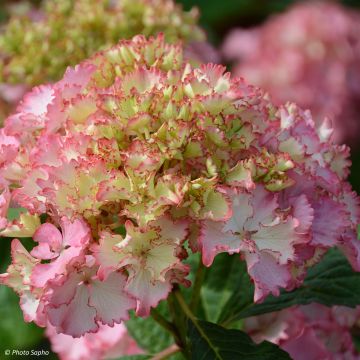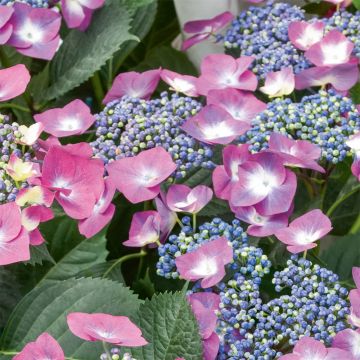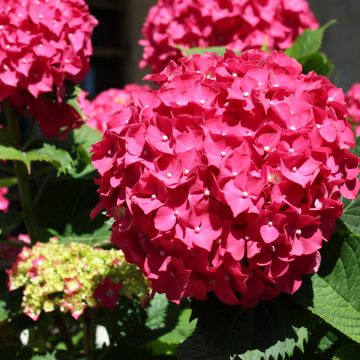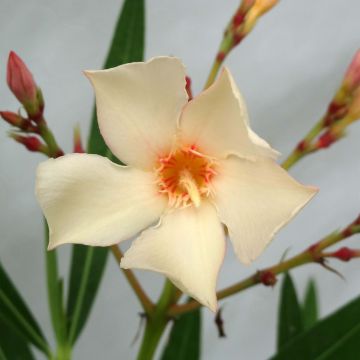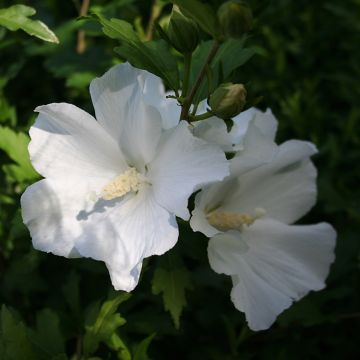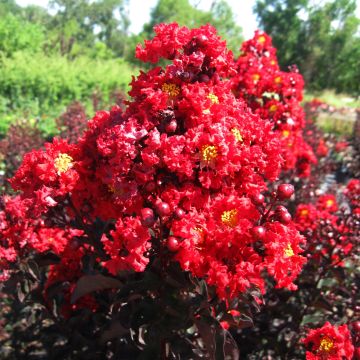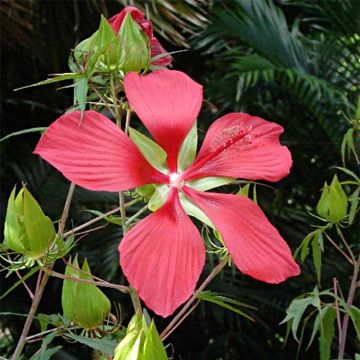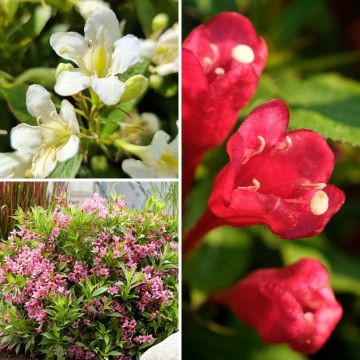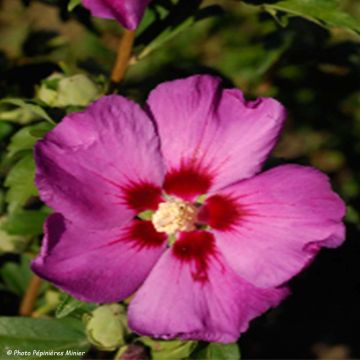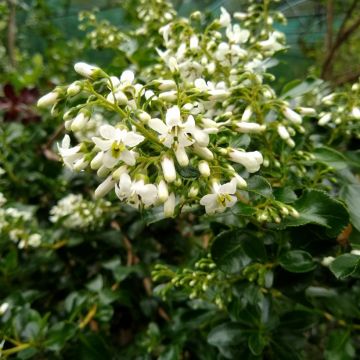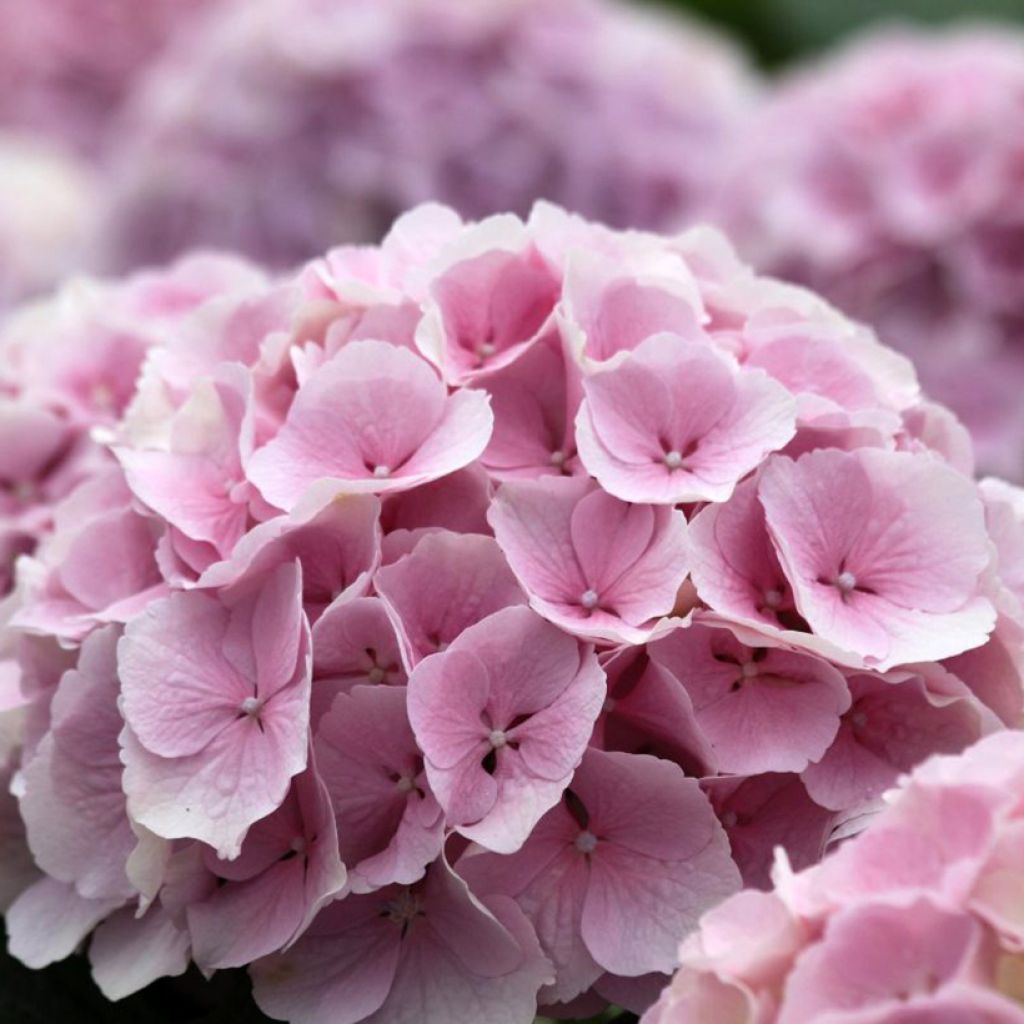

Hydrangea macrophylla Everbloom Pink Wonder- Mophead Hydrangea
Hydrangea macrophylla Everbloom Pink Wonder- Mophead Hydrangea
Hydrangea macrophylla Everbloom® Pink Wonder
Bigleaf Hydrangea, Mophead Hydrangea
This item cannot be shipped to the selected country
Delivery charge from €5.90
More information
Schedule delivery date,
and select date in basket
This plant carries a 24 months recovery warranty
More information
We guarantee the quality of our plants for a full growing cycle, and will replace at our expense any plant that fails to recover under normal climatic and planting conditions.
From €5.90 for pickup delivery and €6.90 for home delivery
Express home delivery from €8.90.
Does this plant fit my garden?
Set up your Plantfit profile →
Description
The Hortensia macrophylla Everbloom 'Pink Wonder' is part of a series that, unlike most hydrangeas, blooms on both old wood and new shoots, which also allows its flowering to escape late frosts. For this reason, it also offers abundant flowering and a plant that is less susceptible to pruning mistakes. It is therefore an ideal hydrangea for beginner gardeners. This variety offers gradually pink flowers that turn green and red at the end of the season. In very acidic soil, the colour is a pastel violet blue. Suitable for shaded beds or the terrace, in non-calcareous soil.
The Hydrangea macrophylla 'Pink Wonder', like many cultivars, is a crossbreed between the H. macrophylla and H. aspera species, among others. All these hardy plants, native to China and Japan, belong to the Hydrangeaceae family. The bush has a compact and upright habit and reaches a height of 80 cm to 1 m and a width of 50 to 80 cm at maturity. Flowering begins in June and continues until September-October, supported by strong stems that prevent the plant from collapsing under its weight. The medium-sized globular inflorescences are composed of multiple sterile florets. Each floret is pink, ranging from very pale pink to lavender pink, and ends its cycle in green and reddish hues. The flowering period spreads over a lush and glossy dark green foliage. The leaves are opposite, reaching about fifteen centimetres in length. They are simple, ovate to elliptical, with a pointed tip and regularly toothed edges. Hydrangeas can live for at least 50 years.
'Pink Wonder' Hydrangea is a robust, generous, and charming plant, ideal for enhancing shaded areas of the garden and for container cultivation. Known for beautifying north-facing exposures, hydrangeas, especially this variety, also thrive in east or west-facing areas where the sun is not too intense, whether in flower beds or hedges. Its compact form is perfectly suited for container cultivation, which you can place on a terrace, in a beautiful set of pottery, or near the entrance of the house. Although hydrangeas dislike lime, they are not strictly ericaceous plants: they need fertile soil, whereas ericaceous soil, although very acidic, is also very nutrient-poor. For a lively garden, combine them with Fuchsia magellanica or spring-flowering bulbs such as tulips or summer-flowering bulbs like lilies in front of their rounded silhouette to enjoy their opulent flowering for a longer time.
Report an error about the product description
Hydrangea macrophylla Everbloom Pink Wonder- Mophead Hydrangea in pictures
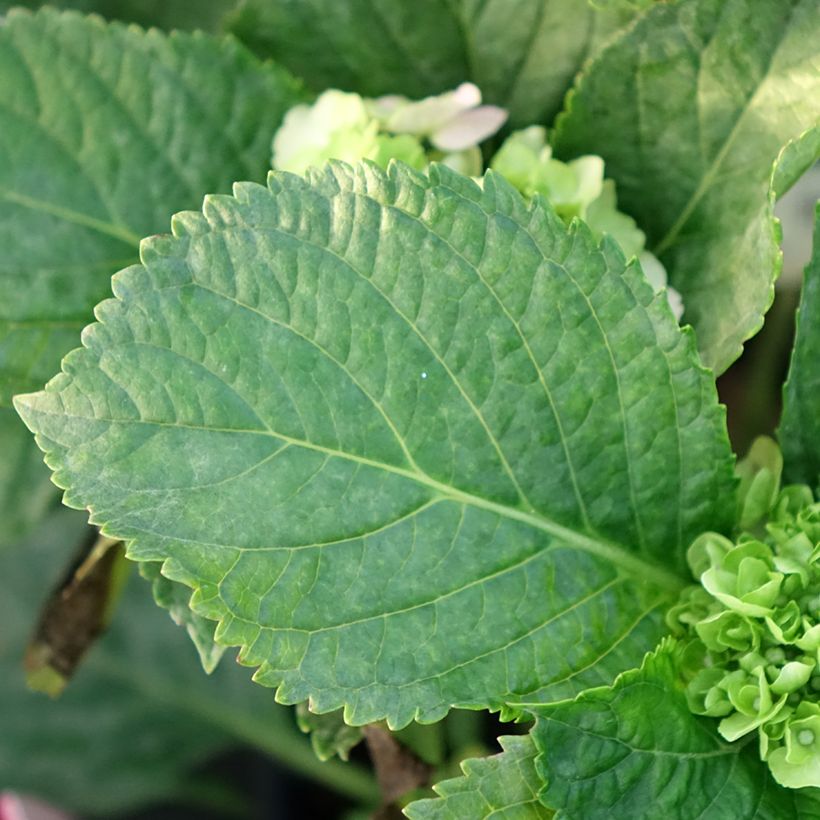

Plant habit
Flowering
Foliage
Botanical data
Hydrangea
macrophylla
Everbloom® Pink Wonder
Hydrangeaceae
Bigleaf Hydrangea, Mophead Hydrangea
Cultivar or hybrid
Other Hydrangea Macrophylla
Planting and care
Plant the Everbloom Pink Wonder macrophylla hydrangea in spring or early autumn, preferably in a slightly shaded location, for example against an east-facing wall or even to the north. It does not require ericaceous soil (very acidic but poor), but appreciates a deep, moist but well-drained, fairly fertile soil, possibly enriched with a good base fertiliser before planting. If the soil is dry at the base of the wall, install the root ball at least 30-40 cm away from the base of the wall and incorporate a quantity of well-rotted compost to better retain moisture in the soil. As for pruning, remove faded flowers on the first bud or on the pair of buds directly below. Cut back one quarter to one third of the oldest stems at the base when the plant is mature to promote the formation of new shoots. Perform this pruning every year during the months of March and April.
Planting period
Intended location
Care
This item has not been reviewed yet - be the first to leave a review about it.
Summer-flowering shrubs
Haven't found what you were looking for?
Hardiness is the lowest winter temperature a plant can endure without suffering serious damage or even dying. However, hardiness is affected by location (a sheltered area, such as a patio), protection (winter cover) and soil type (hardiness is improved by well-drained soil).

Photo Sharing Terms & Conditions
In order to encourage gardeners to interact and share their experiences, Promesse de fleurs offers various media enabling content to be uploaded onto its Site - in particular via the ‘Photo sharing’ module.
The User agrees to refrain from:
- Posting any content that is illegal, prejudicial, insulting, racist, inciteful to hatred, revisionist, contrary to public decency, that infringes on privacy or on the privacy rights of third parties, in particular the publicity rights of persons and goods, intellectual property rights, or the right to privacy.
- Submitting content on behalf of a third party;
- Impersonate the identity of a third party and/or publish any personal information about a third party;
In general, the User undertakes to refrain from any unethical behaviour.
All Content (in particular text, comments, files, images, photos, videos, creative works, etc.), which may be subject to property or intellectual property rights, image or other private rights, shall remain the property of the User, subject to the limited rights granted by the terms of the licence granted by Promesse de fleurs as stated below. Users are at liberty to publish or not to publish such Content on the Site, notably via the ‘Photo Sharing’ facility, and accept that this Content shall be made public and freely accessible, notably on the Internet.
Users further acknowledge, undertake to have ,and guarantee that they hold all necessary rights and permissions to publish such material on the Site, in particular with regard to the legislation in force pertaining to any privacy, property, intellectual property, image, or contractual rights, or rights of any other nature. By publishing such Content on the Site, Users acknowledge accepting full liability as publishers of the Content within the meaning of the law, and grant Promesse de fleurs, free of charge, an inclusive, worldwide licence for the said Content for the entire duration of its publication, including all reproduction, representation, up/downloading, displaying, performing, transmission, and storage rights.
Users also grant permission for their name to be linked to the Content and accept that this link may not always be made available.
By engaging in posting material, Users consent to their Content becoming automatically accessible on the Internet, in particular on other sites and/or blogs and/or web pages of the Promesse de fleurs site, including in particular social pages and the Promesse de fleurs catalogue.
Users may secure the removal of entrusted content free of charge by issuing a simple request via our contact form.
The flowering period indicated on our website applies to countries and regions located in USDA zone 8 (France, the United Kingdom, Ireland, the Netherlands, etc.)
It will vary according to where you live:
- In zones 9 to 10 (Italy, Spain, Greece, etc.), flowering will occur about 2 to 4 weeks earlier.
- In zones 6 to 7 (Germany, Poland, Slovenia, and lower mountainous regions), flowering will be delayed by 2 to 3 weeks.
- In zone 5 (Central Europe, Scandinavia), blooming will be delayed by 3 to 5 weeks.
In temperate climates, pruning of spring-flowering shrubs (forsythia, spireas, etc.) should be done just after flowering.
Pruning of summer-flowering shrubs (Indian Lilac, Perovskia, etc.) can be done in winter or spring.
In cold regions as well as with frost-sensitive plants, avoid pruning too early when severe frosts may still occur.
The planting period indicated on our website applies to countries and regions located in USDA zone 8 (France, United Kingdom, Ireland, Netherlands).
It will vary according to where you live:
- In Mediterranean zones (Marseille, Madrid, Milan, etc.), autumn and winter are the best planting periods.
- In continental zones (Strasbourg, Munich, Vienna, etc.), delay planting by 2 to 3 weeks in spring and bring it forward by 2 to 4 weeks in autumn.
- In mountainous regions (the Alps, Pyrenees, Carpathians, etc.), it is best to plant in late spring (May-June) or late summer (August-September).
The harvesting period indicated on our website applies to countries and regions in USDA zone 8 (France, England, Ireland, the Netherlands).
In colder areas (Scandinavia, Poland, Austria...) fruit and vegetable harvests are likely to be delayed by 3-4 weeks.
In warmer areas (Italy, Spain, Greece, etc.), harvesting will probably take place earlier, depending on weather conditions.
The sowing periods indicated on our website apply to countries and regions within USDA Zone 8 (France, UK, Ireland, Netherlands).
In colder areas (Scandinavia, Poland, Austria...), delay any outdoor sowing by 3-4 weeks, or sow under glass.
In warmer climes (Italy, Spain, Greece, etc.), bring outdoor sowing forward by a few weeks.

































